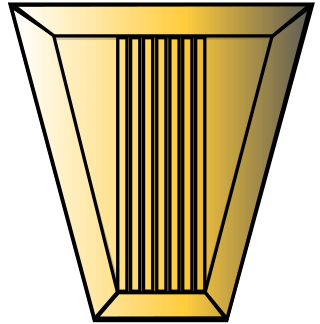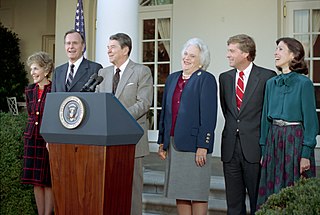
The United States Office of Personnel Management (OPM) is an independent agency of the United States government that manages the United States federal civil service. The agency provides federal human resources policy, oversight, and support, and tends to healthcare (FEHB), life insurance (FEGLI), and retirement benefits for federal government employees, retirees, and their dependents.
The excepted service is the part of the United States federal civil service that is not part of either the competitive service or the Senior Executive Service. It allows streamlined hiring processes to be used under certain circumstances.

The Combined Federal Campaign (CFC) is the workplace giving program of the federal government of the United States. The program is authorized by executive order 12353 of March 23, 1982, and is overseen by the United States Office of Personnel Management (OPM). Issued by President Reagan, the order states that a CFC objective is "to lessen the burdens of government and of local communities in meeting needs of human health and welfare ..." According to OPM's website, the mission of the CFC "is to promote and support philanthropy through a program that is employee focused, cost-efficient, and effective in providing all federal employees the opportunity to improve the quality of life for all".

The Senior Executive Service (SES) is a position classification in the United States federal civil service equivalent to general officer or flag officer rank in the U.S. Armed Forces. It was created in 1979 when the Civil Service Reform Act of 1978 went into effect under President Jimmy Carter.

Constance Ernestine Berry Newman is an American attorney and diplomat who served as the United States Assistant Secretary of State for African Affairs from July 2004 to April 2005.
The United States federal civil service is the civilian workforce of the United States federal government's departments and agencies. The federal civil service was established in 1871. U.S. state and local government entities often have comparable civil service systems that are modeled on the national system to varying degrees.

Kay Coles James is an American public official who served as secretary of the Commonwealth of Virginia from January 2022 to August 2023, and as the director for the United States Office of Personnel Management under President George W. Bush from 2001 to 2005. Previous to the OPM appointment, she served as Virginia secretary of health and human resources under then-Governor George Allen and was the dean of Regent University's government school. She is the president and founder of the Gloucester Institute, a leadership training center for young African Americans.
Elizabeth M. Duke was the administrator for the Health Resources and Services Administration (HRSA) from March 6, 2002 to February 28, 2009.
Dan Gregory Blair currently serves as an independent senior consultant to the U.S. Agency for Global Media. Formerly, Blair served in senior positions in the nonprofit sector. He served as a senior counselor examining and recommending reforms on the presidential appointments process for the Center on Presidential Transition. He also served as Fellow and Senior Counselor at the Bipartisan Policy Center and led a task force of government and private sector management experts charged with examining government oversight issues. He also advises private sector clients on a broad array of government management and postal issues.

Stewart Liff is an American author and management consultant known for his work in Human Resources Management, Performance Management, Visual Management and team development. Liff has served in various senior government personnel and management positions and as a consultant and teacher to government agencies and businesses. He has written seven books, is a frequent conference speaker, and is a regular contributing author to government and professional publications.

James Strock is an American writer, speaker, businessman, and former senior-level public official. Strock is the author of three books on leadership, and a fourth on political reform in the United States. Based in Rancho Santa Fe, California, he is a frequent speaker at conferences and corporate events across the U.S. and in other nations. Strock previously served as the founding Secretary of the California Environmental Protection Agency, and as Assistant Administrator for Enforcement of the U.S. Environmental Protection Agency.
According to the United States Office of Government Ethics, a political appointee is "any employee who is appointed by the President, the Vice President, or agency head". As of 2016, there were around 4,000 political appointment positions which an incoming administration needs to review, and fill or confirm, of which about 1,200 require Senate confirmation. The White House Presidential Personnel Office (PPO) is one of the offices most responsible for political appointees and for assessing candidates to work at or for the White House.

Dorcas Ruth Hardy Spagnolo was an American healthcare specialist. She served as the 10th Commissioner of the Social Security Administration (SSA) from 1986 to 1989. She was the first woman to serve as SSA Commissioner. Hardy held conservative views and remained active in politics after her tenure.
A Schedule C appointment is a type of political appointment in the United States for confidential or policy roles immediately subordinate to other appointees. As of 2016, there were 1,403 Schedule C appointees. Most of these are confidential assistants, policy experts, special counsels, and schedulers, although about 500 of them are non-policy support roles. Schedule C appointments were created in 1956 and are part of the excepted service.

George Nesterczuk is an American political advisor, consultant, and government official. He was nominated by President Donald Trump in June 2017 to become the Director of the United States Office of Personnel Management, but he later withdrew his candidacy over potential delays in the confirmation process.

Patrick Pizzella is a former American government official who served as the 36th United States Deputy Secretary of Labor from April 17, 2018 to January 20, 2021. He was formerly a member of the Federal Labor Relations Authority appointed by President Barack Obama. He held positions in several agencies during four prior Administrations. In 2019, after the resignation of Alexander Acosta, Pizzella served as the acting United States Secretary of Labor for more than 2 months. He currently serves as the elected Mayor of the village of Pinehurst, North Carolina.

The White House Presidential Personnel Office (PPO), sometimes written as Office of Presidential Personnel, is the part of the White House Office tasked with vetting new appointees. Its offices are on the first floor of the Eisenhower Executive Office Building in Washington, D.C. The PPO is one of the offices most responsible for assessing candidates to work at or for the White House.
A Schedule F appointment was a job classification in the excepted service of the United States federal civil service that existed briefly at the end of the Trump administration during 2020 and 2021. It would have contained policy-related positions, removing their civil service protections and making them easy to fire. It was never fully implemented, and no one was appointed to it before it was repealed at the beginning of the Biden administration.

The presidential transition of George H. W. Bush began when then-Vice President Bush won the United States 1988 United States presidential election, becoming the president-elect, and ended when Bush was inaugurated on January 20, 1989.

The presidential transition of Ronald Reagan began when he won the 1980 United States presidential election, becoming the president-elect, and ended when Reagan was inaugurated on January 20, 1981.













